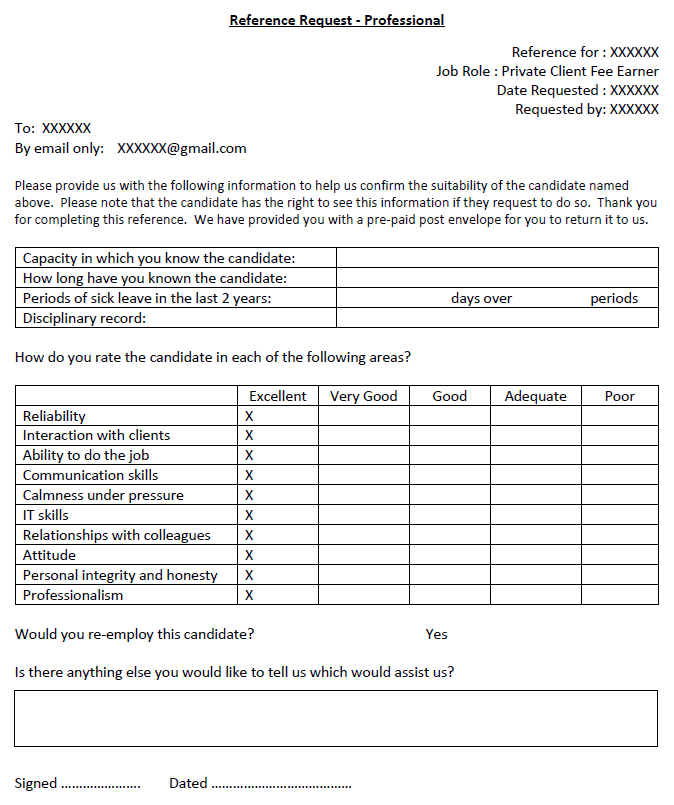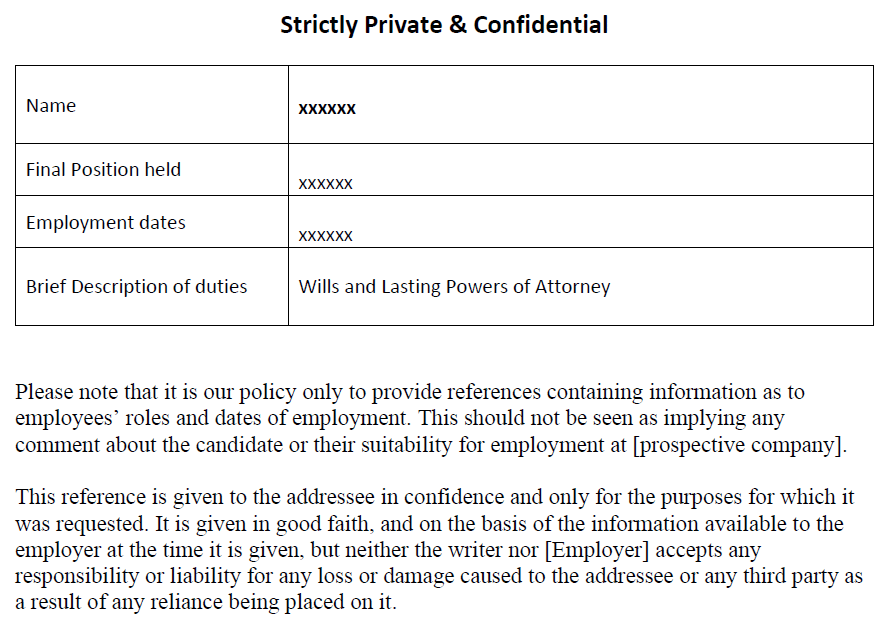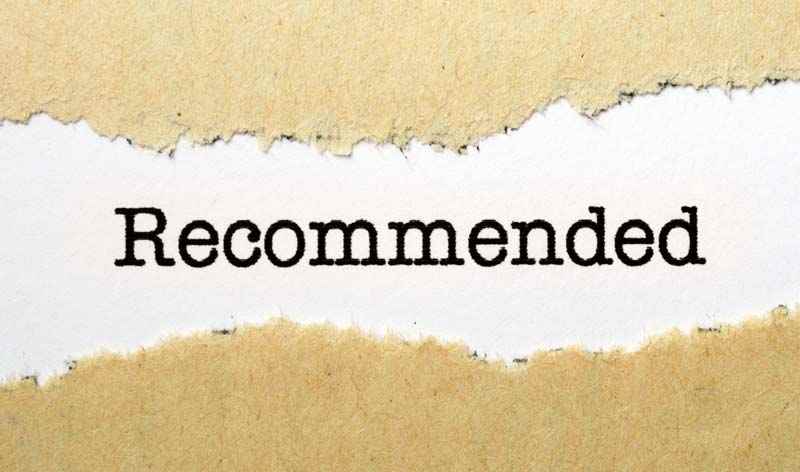CV references are individuals who can provide first-hand info related to your career applications and attest to your expertise and abilities, qualities and experiences. In essence, they support the accuracy of the information that you’ve given in your CV and during the recruitment process.
How many references do I need?
Prospective employers usually expect two references. One will typically be your current employer and the other will be a previous employer, tutor or someone with knowledge of your abilities, such as a community project leader.
Do I need to include my reference contact details on my CV?
You can include the names and contact details of references on your CV but it is not absolutely necessary. Some people are wary of giving references in advance of a job offer, particularly if they are still employed. If you leave your references off your CV, the employer will ask for them anyway if they intend to make an offer. If you decide to include them, put them right at the end of the CV template.
What information will employers need about my references?
If you do provide references on your CV, give their name, job title and ideally an email address and phone number for each. Nowadays employers will rarely bother writing to references via ‘snail mail’ and most reference requests will be sent through email on a pro forma.
Who should I choose as my CV references?
It is typical to give your most recent employer as your first reference. Even if the role isn't particularly relevant to the job you're applying for, your current employer can confirm a lot of information such as your dates of employment, reliability and trustworthiness.
You have more flexibility over who to include as your second reference. It will usually be someone from a different organisation, such as a manager or supervisor from a previous role, or someone with excellent knowledge of your work. If you have studied recently, a tutor who is aware of your knowledge and expertise could be a good choice.
If you have worked on a community project or completed a placement or voluntary role, a relevant supervisor from such activities would also be an acceptable choice.
If you work in the family business, try if possible not to use someone with the same surname as yours for a reference. Their opinion might be regarded as biased!
Which person should I ask to provide a reference?
Your current employer may have a dedicated HR department or manager. If so, it is likely they will provide the reference. You might instead decide to list your line manager as the point of contact, but don’t be surprised if they have to pass on the reference request to someone else – this is often company policy.
If you have flexibility as to who to name, consider which person has the best knowledge of your work. This might for example be a line manager, supervisor or project manager, rather than a department head.
When will my prospective employer obtain a reference?
Most prospective employers will wait until making a job offer before they contact your references. However, very occasionally, you may find that a prospective employer asks your permission to contact your references prior to the interview. It is uncommon that an employer will contact references prior to the interview without asking you first.
Does my employer have to provide a reference?
No. Current and past employers are under no obligation to give a reference, unless (a) they have a written agreement with you to do so, or (b) they are regulated by the FSA.
Can my employer give me a bad reference?
Yes they could. However, they owe duties both to you and your new employer. They must take reasonable care to ensure the information contained in the reference is true, accurate and fair. They also owe you a duty to ensure the reference does not contain defamatory statements. Solicitors Irwin Mitchell explain: "This means that they must not compile the reference maliciously or negligently, and thereby give an impression which is either too negative or misleadingly positive. So if you have been a poor performer, or regularly turned up for work late, and the employer has evidence of this, they can say so.”
Can my employer give me a good reference, even if I performed poorly?
No. They owe duties to your new employer to ensure the reference is not misleadingly positive. For example, if you were sacked for gross misconduct, the employer cannot simply invent another reason such as redundancy, for dismissal, to help you to get another job.
What happens if my employer gives me an inaccurate reference?
If your employer gives you an inaccurate negative reference, you could bring a claim for damages in negligence for lost earnings if you can show that the reference (rather than, say, your lack of skills) resulted in you not being offered the job. You can get further advice about this from the Citizen's Advice Bureau.
If your employer gives a misleading positive reference, your new employer can claim against them for damages and wasted recruitment costs, if they can show that without the reference, they would not have hired you.
Should I prepare a prospective employer for a bad reference?
If your prospective employer insists on a reference from your current or most recent employer and this is likely to be negative, it is a good idea to discuss this when you are offered the job (which will usually be 'subject to references'). Avoid bad-mouthing your current or previous employer - instead try to explain factually and constructively why the relationship broke down.
Should I ask someone to be my reference first before giving their details?
If possible, it is better to ask your potential references if they would mind providing a reference first before giving out their details. However, if you are employed when you started job hunting, prospective employers will be well aware that checking with your current employer is not realistic! They will usually be happy to wait until they offer you the role before you approach managers for a reference. Your job offer will likely be ‘subject to references’, meaning that the offer may not stand if they receive a negative reference.
Do I have a right to see a copy of my reference?
You can ask the new employer for a copy of a reference as this is data they hold about you. You have no right to ask this of the person who provided the reference.
Can I be sacked if my new employer asks my current employer for a reference while I'm still working there?
In short, no. If your current employer fires you because the new employer has approached them for a reference, you may be able to claim damages through the courts. Speak to the Citizen's Advice Bureau for further advice.
My employment contract says my employer will provide a reference, but they're refusing to do so!
In this scenario you may be able to claim damages through the courts. Speak to the Citizen's Advice Bureau for further advice.
Are there advantages to putting references on my CV?
Including the contact details of your references on your CV can give the appearance of confidence. You're happy for prospective employers to contact these people if there's a job offer on the table, because you know the contents of the reference will be good! If your reference will be given by someone who is well respected or even well know, this can also give your CV a little credibility boost.
Can I include more than two references on my CV?
Whilst it's not a hard and fast rule, two references is the expected number. The employer won't want to contact any more than two people - and providing more will just leave them wondering which to choose. If you want more testimonials, ask people to provide a recommendation on LinkedIn, then include your LinkedIn profile handle at the top, under your contact details. Find out more about building an effective LinkedIn profile to complement your CV here.
How do I ask someone to be a reference for my CV?
Aside from your current employer, it is a good idea to ask references in advance of using their details, by calling them or by sending an email. Ask them if they feel comfortable giving a positive reference - this gives them the opportunity to politely decline if they don’t believe that they can.
What will my employer include in my reference?
Your prospective employer will want your current or most recent employer to confirm your dates of employment and job title as a bare minimum.
Typically your prospective employer will ask questions on matters such as time off sick, reliability, ability to do the job, communication skills, calmness under pressure, relationships with colleagues, attitude, personal integrity and honesty, and professionalism. Here is a typical example of a reference request form:

However, it is fairly common for companies (other than those regulated by the FSA) to respond with a generic reference that confirms little more than your dates of employment and job title. Here is an example:

What happens if my employer gives a bad reference?
The reason why employers are often reluctant to provide too much information in response to a reference request is because
(a) they don’t have to provide a reference (unless it is in your contract that they must, or they are FSA regulated); but
(b) if they do provide one, they owe duties to both you and your new employer to ensure the reference given is true, accurate and fair.
They cannot include anything defamatory (i.e. negative information that they cannot back up with proof), nor can they make the reference misleadingly positive.
Gov.uk explains:
If [your employer gives] a reference it:
- must be fair and accurate – and can include details about workers’ performance and if they were sacked
- can be brief – such as job title, salary and when the worker was employed
If the worker thinks they’ve been given an unfair or misleading reference, they may be able to claim damages in a court. The previous employer must be able to back up the reference, such as by supplying examples of warning letters.
Workers must be able to show that:
- it’s misleading or inaccurate
- they ‘suffered a loss’ – for example, a job offer was withdrawn
As you can see from the above law, it is easier for employers to give minimal information than to risk being taken to court – or for them not to give a reference at all!
What makes someone a good choice to act as my reference?
Certain qualities will make someone a better reference:
- An organised person who is likely to respond
- Someone who is articulate and is easily able to express themselves well
- Someone who has good knowledge of your work and achievements
If you’re still debating whether to include your references on your CV or not, consider this video by KISSS Career Coaching:
This article was originally published 11th February 2016 and has been updated for 2021.
